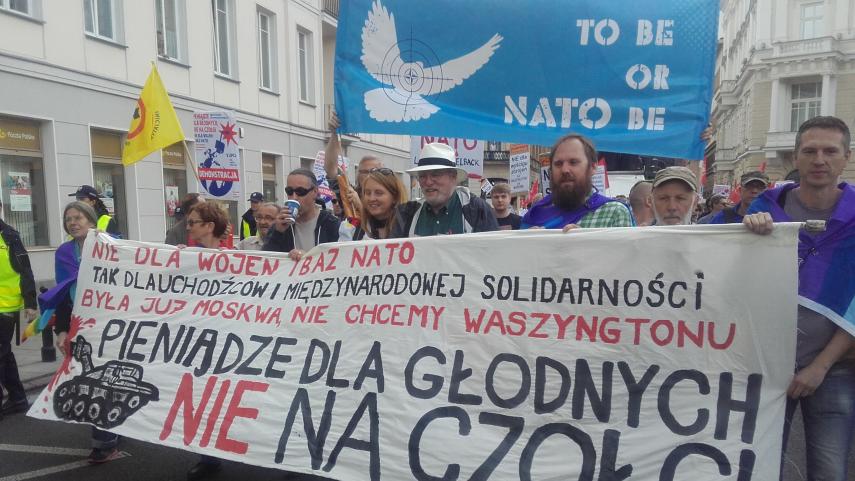The No to war – No to NATO Network condemns the proposals for a new NATO agenda, outlined in 'NATO 2030: United for a New Era'. The report presents a dangerous expansion plan that will increase tension and the risk of war.
Introduction
In 2020 NATO-Secretary-General Stoltenberg commissioned a group of 10 ‘experts’ to reflect on the future of NATO. In their report NATO 2030: United for a new Era they come up with 138 proposals that are supposed to help the military alliance meet key challenges in the next decade. The report, while not yet formally adopted by NATO, will be used to inspire the next NATO summit scheduled to be held in Brussels later this year.
Principles of Democracy
The document reiterates the propagandistic claim that the alliance is based on ‘the principles of democracy, individual liberty and the rule of law … to promote stability and well-being in the North Atlantic area’. In reality, NATO’s history is soaked in blood. The military alliance and several of its member states have helped initiate coups d’état and supported dictatorships. They fought wars worldwide, destabilizing countries such as Algeria, Vietnam, the Balkans, Afghanistan, Iraq and Libya, resulting in millions of innocent victims and so called ‘failed states’. The new agenda will continue endless war.
China + Russia – enemy images
NATO 2030 employs a world vision in terms of threats, with the primary aim of legitimizing rearmament and global military expansion, even though NATO and its member states are often responsible for many of these threats. The report uses hostile language stigmatising China and Russia as ‘systemic rivals’ with recommendations that will lead to growing confrontation. While there is no immediate threat from either country, NATO is ramping up propaganda to justify rising military spending, even though the COVID-19 pandemic is having a huge impact on government budgets.
NATO 2030 is littered with enemy images, demonizing above all Russia and China. Non-military solutions without domination and aggression are unthinkable for NATO. This even includes challenges like climate change, loss of biodiversity and environmental protection.
Nuclear weapons, NPT and TPNW
While paying (less then) lip service to arms control, the report stresses the need for deterrence and maintaining nuclear arms, advocating the revitalization of nuclear-sharing arrangements as a critical element of NATO’s deterrence policy. NATO demands that its members engage in nuclear burden-sharing. Three NATO members, the United States, United Kingdom and France, possess nuclear weapons and are modernizing their arsenals. Five NATO members, Germany, Belgium, Netherlands, Italy and Turkey, host American nuclear weapons on their territory.
The No to war – No to NATO Network opposes NATO’s nuclear armament policy in violation of the NPT’s nuclear disarmament commitments and condemns the alliance’s disinformation campaign against the Treaty on the Prohibition of Nuclear Weapons (TPNW). A plan must be drawn up, based on negotiations in the short term, to work towards a nuclear-free zone in Europe as an important step towards a nuclear-free world. Member states should not let themselves be intimidated by NATO and its nuclear weapon states not to sign the TPNW. Shamefully, the alliance is preventing its members from joining the Treaty.
EU and NATO
Although some members of the EU stick to a policy of a neutrality and aren’t NATO members, the report suggests deepening institutional ties with the EU in military matters. Complementary independent European defence capabilities and military actions aligned with NATO goals are welcomed as part of a burden-sharing agenda that strengthens the military power of NATO. The goal of spending 2% of GDP for military purposes is shared by NATO and EU.
Security
The No to war-No to Nato Network rejects the militaristic approach to security as expressed in the NATO 2030 report; it diverts billions into armaments and military expansion and will only increase the likelihood of military confrontation. Our society needs disarmament, diplomacy and cooperation, investment in health care, social services and measures to avoid climate change. Only comprehensive security in which diplomatic agreements are made with Russia and China on disarmament, confidence-building measures and economic and political cooperation can bring a just and lasting peace. The EU must not be reduced to a branch of NATO. Together with its member states, it should pursue an autonomous, peaceful and demilitarized security policy, building on the principles of the Helsinki Final Act.
2% GDP & Military Industrial Complex
NATO 2030 confirms NATO as a war alliance that serves the interests of the military industrial complex, not of the people. It will not bring human security. The No to war-No to Nato Network calls for the 2% standard for military spending and the armaments obligation (20% of the military budgets) – undemocratically decided at the NATO summit in Wales – to be repealed. The resources must be used instead to combat the COVID-19 pandemic and to enhance human security in general. NATO’s demand to increase military spending prevents countries from adequately investing in health care, social services and climate action. Disarmament is the central challenge.
Dissolution of NATO and the strengthening of the UN
The No to war – No to NATO Network will continue to push for the dissolution of NATO. It will work to empower the United Nations, as well as regionally inclusive civil institutions, in the pursuit of competent international platforms for conflict resolution, common security and sustainable development.
Therefore, the No to war – No to NATO Network firmly rejects NATO 2030. By diverting attention and resources to militarism, NATO 2030 will also make it impossible for the international community to achieve the urgent Paris Agreement climate targets and the United Nations’ Sustainable Development Goals by 2030. We need global solidarity and international cooperation to solve our common challenges: the pandemic, the climate emergency, and inequality. With diplomacy, disarmament and sustainable development through the United Nations system, there is no need for this western hemisphere-dominated, anachronistic military alliance. We continue to call for the dissolution of NATO.
February, 19th, 2021
